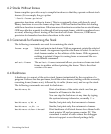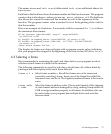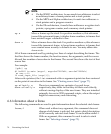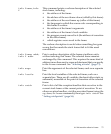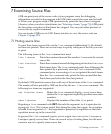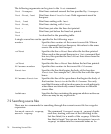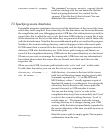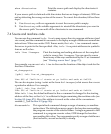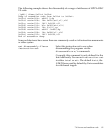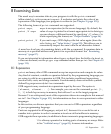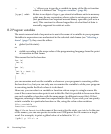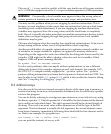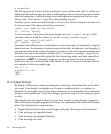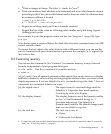show directories
Print the source path and display the directories it
contains.
If your source path is cluttered with directories that are no longer of interest, GDB can
end up detecting the wrong version of the source. To correct this situation, follow these
steps:
1. Use directory with no arguments to reset the source path to empty.
2. Use directory with suitable arguments to reinstall the directories you want in
the source path. You can add all the directories in one command.
7.4 Source and machine code
You can use the command info line to map source lines to program addresses (and
vice versa), and the command disassemble to display a range of addresses as machine
instructions. When run under GNU Emacs mode, the info line command causes
the arrow to point to the line specified. Also, info line prints addresses in symbolic
form as well as hex.
info line linespec
Print the starting and ending addresses of the compiled
code for source line linespec. You can specify source
lines in any of the ways understood by the list command
(see “Printing source lines” (page 77)).
For example, we can use info line to discover the location of the object code for the
first line of function.
m4_changequote:
((gdb)) info line m4_changequote
Line 895 of "builtin.c" starts at pc 0x634c and ends at 0x6350.
We can also inquire (using *addr as the form for linespec) what source line covers
a particular address. For example,
((gdb)) info line *0x63ff
Line 926 of "builtin.c" starts at pc 0x63e4 and ends at 0x6404.
After info line, the default address for the x command is changed to the starting
address of the line, so that 'x/i' is sufficient to begin examining the machine code (see
Section 8.5 (page 87)). Also, this address is saved as the value of the convenience
variable $_ (see Section 8.9 (page 96)).
disassemble
This specialized command dumps a range of memory as machine
instructions. The default memory range is the function surrounding
the program counter of the selected frame. A single argument to this
command is a program counter value; GDB dumps the function
surrounding this value. Two arguments specify a range of addresses
(first inclusive, second exclusive) to dump.
80 Examining Source Files



